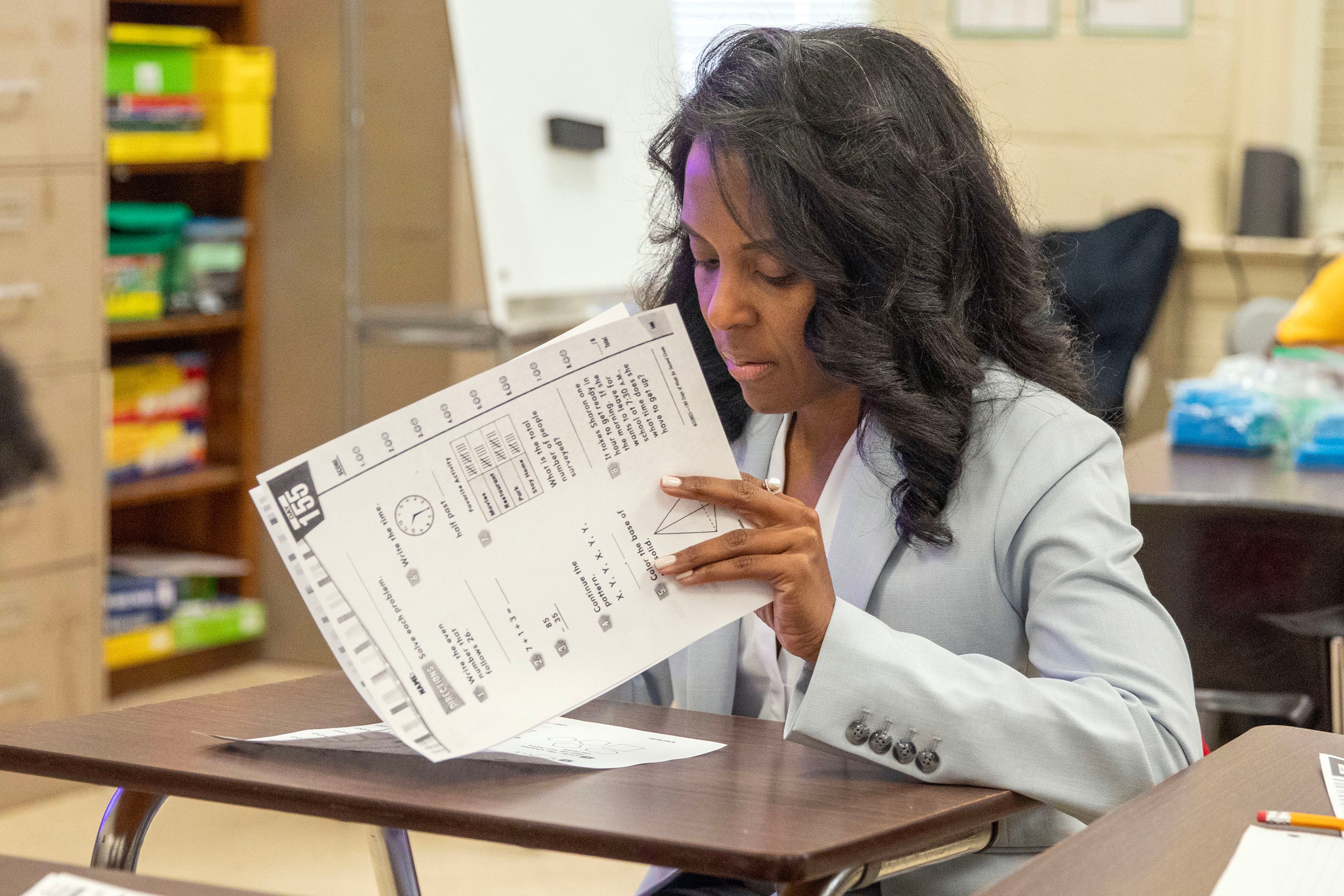Sign up for Chalkbeat Tennessee’s free daily newsletter to keep up with Memphis-Shelby County Schools and statewide education policy.
With less than a month until the new budget year, Memphis school board members pressed Superintendent Marie Feagins for specifics about 1,100 position cuts that they say come as an 11th-hour surprise.
The budget issue came to a head Monday, when Feagins emailed Memphis-Shelby County Schools staff explaining the number of cuts, when jobs would end, and deadlines for accepting job reassignments.
The lack of public discussion about the cuts resulted in chaos and confusion for the thousands of staff who received the email, board members said during a special meeting Tuesday.
Districts across the country have been bracing for staff changes and layoffs with the end of one-time federal pandemic relief funds, often referred to by the acronym ESSER. Memphis knew these changes were coming, and the board and staff talked through potential cuts in a November retreat.
But since then, and throughout Feagins’ onboarding as superintendent this spring, few particulars have been publicly requested by the school board or offered by district administration.
The lack of public deliberation by board members as they appointed a new superintendent and many members face re-election has left the expansive changes to be ironed out as the clock ticks on the current budget year.
“When you are going to do something drastic, the board must be brought along,” Memphis board Chair Althea Greene said Tuesday.
Greene brought a resolution directing Feagins to pause the cuts until providing more specificity about them, which passed with one “no” vote by Mauricio Calvo. But the district’s general counsel Justin Bailey said MSCS would still have to notify staff in order to meet regulatory requirements about layoff notices, which effectively makes the resolution moot.
“I am excited to do this work. I am taking this with pride to bring before you the hardest decisions that have not been made in previous years before me. … I take this serious,” Feagins told the board. “You could take the ($325,000 salary) from me today and I’ll show up tomorrow.”
Feagins’ proposal to cut 1,100 positions will result in about $68 million in savings for the district, MSCS officials told Chalkbeat. Of the roles, about 41% are vacancies, leaving some 650 people facing a job loss or reassignment.
The district of nearly 110,000 students will still employ about 14,000 people.
Feagins said she inherited a proposal of 812 position cuts from the prior administration led by then-Interim Superintendent Toni Williams. (Williams now is a consultant on district finance matters, but her role in the current cuts appears unclear.)
Feagins said her additional proposals include cutting 156 early-career teachers whose permits are expiring. She also wants to sunset the district’s use of Proximity Learning, in which students learn in school classrooms from online teachers. That would result in cutting another 70 staffers who worked as in-person monitors for those students, she said.
Among the 812 cuts are likely some of the 675 positions that were initially proposed during the retreat last November. Those included several top-level management roles. Tito Langston, who has been the chief financial officer throughout the superintendent transition, presented those cuts again to board members Tuesday.
“If we don’t make key decisions today, we can punt it, but we’ll be right back here next year,” Langston said. “Matter of fact, even if we don’t punt it, I hate to say this, but I’ll give a preview: We’re probably going to be back right here next year anyway.”
According to the Monday email, about 280 staff still needed to be informed of their job change. Of the 363 staff who had been informed of the cuts, about half had accepted a reassignment, Feagins said.
“Communication is the key,” said Vice Chair Joyce Dorse-Coleman.
Dozens of people attended Tuesday’s meeting wearing black in support of staff who were being cut.
Both Williams and Feagins said they expected to be able to keep many staff through reassignments, but the replacement jobs could pay less. Board members have pushed Feagins in the wake of job cut announcements to make plans that ease salary cuts those staffers may face.
Barbara Beloch, who told the board she was an 18-year employee, petitioned the board to reconsider replacing her role as a parent liaison who helps families navigate the district.
“We are the voice of and for so many parents who feel they do not have a voice in their child’s schools,” Beloch told board members.
The board is expected to vote on the budget and formally approve the cuts before the new fiscal year begins July 1.
A community meeting about the budget — the first this year — is scheduled for 5:30 p.m. Thursday in the board auditorium, 160 S. Hollywood St. You can view the proposed budget on the district’s website.
Laura Testino covers Memphis-Shelby County Schools for Chalkbeat Tennessee. Reach Laura at LTestino@chalkbeat.org.






